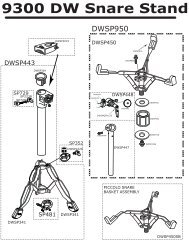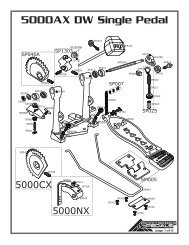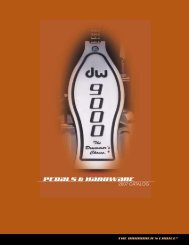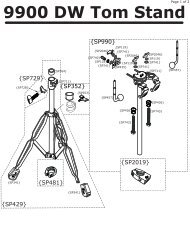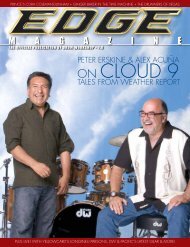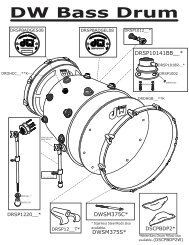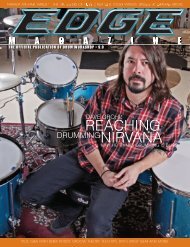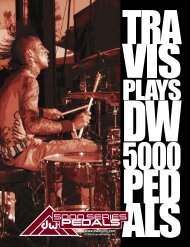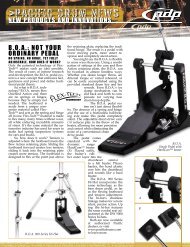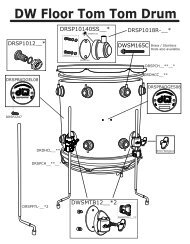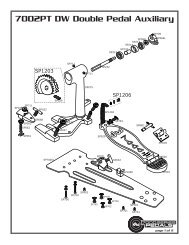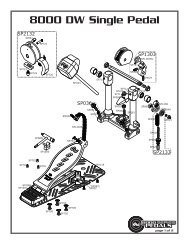You also want an ePaper? Increase the reach of your titles
YUMPU automatically turns print PDFs into web optimized ePapers that Google loves.
I got deeper into the material, the clinic<br />
was turning into two to three hours, so I<br />
decided it was time to document it. In<br />
presenting the material in a clinic format,<br />
I learned a lot about how an audience<br />
would accept it. You know, many people,<br />
when doing their historical homework,<br />
don’t even go back to Ringo, let alone 100<br />
years, so I knew I had something here. I<br />
presented the material in a relaxed, fun<br />
way. I also involved the audience with<br />
a lot of questions, and I’d reward them<br />
with various giveaway items from my<br />
sponsoring companies. I’d just make it<br />
fun. I wanted to take these aspects and<br />
transfer them into the DVD. What I didn’t<br />
want was for this to be like a formal<br />
PBS documentary. I wanted to keep the<br />
interactive aspect of my clinics and feature<br />
some audience member commentary.<br />
RM: You funded a part of this through<br />
Kickstarter.com and I thought your promo<br />
video on that site was brilliant. Talk about<br />
how you came to utilize Kickstarter.com<br />
to fund the project.<br />
DG: Thank you. I had previously appeared<br />
on the show “DC Live” on <strong>Drum</strong>channel.<br />
com and during that time, Don Lombardi<br />
(<strong>Drum</strong> <strong>Workshop</strong> and <strong>Drum</strong> Channel<br />
Founder) and I began talking about the<br />
idea. He was very interested in it, but my<br />
rather grandiose idea for the final outcome<br />
would cost a bit more than could come<br />
solely from <strong>Drum</strong> Channel, so I began<br />
looking into sites that offer what’s called,<br />
crowdfunding. I came across Kickstarter<br />
and liked their approach to the concept.<br />
They seemed to be the best known for<br />
this, even though they’re an all-or-nothing<br />
venture. Meaning, if you don’t achieve<br />
your goal, you’re basically back to squareone<br />
(each project sets a financial goal to<br />
reach within a specific time period. If<br />
the goal isn’t’ met, monies are refunded<br />
to contributors). Because they’re the best<br />
known, they have a large audience, which<br />
is what you want when obtaining public<br />
funding.<br />
RM: Talk about the various rewards or<br />
incentives you offered to encourage<br />
potential funders to contribute to your idea.<br />
DG: What’s cool about Kickstarter, and<br />
what I believe makes one successful with<br />
it, is that you have a chance to open up<br />
yourself personally to those viewing your<br />
idea. You basically offer different levels<br />
of rewards for various levels of monetary<br />
funding–the more you donate, the more<br />
you receive from the creator. Obviously,<br />
the higher you go, the better the reward. I<br />
did a huge amount of research on creating<br />
an effective promo clip for it and also<br />
researched other successful pages that had<br />
achieved their goals. I also looked at what<br />
kinds of rewards they offered.<br />
RM: Your rewards included a vintage<br />
Leedy snare, backstage passes, Royal<br />
Crown Revue CDs and even a Day with<br />
Daniel in LA; really great stuff. Even<br />
though you’ve already achieved your<br />
goal, I encourage all of our readers to<br />
check out your page on Kickstarter, it’s<br />
really cool and inspiring. How did you<br />
put the promo clip together for that page?<br />
DG: I had the idea for the content and<br />
basically knew what I wanted, and I had<br />
a friend who worked at the Columbia Film<br />
School edit it for me. It was a lot of work to<br />
not only create the clip, but also manage<br />
all of the donation levels. Once you<br />
complete your goal, before you collect,<br />
Kickstarter takes their cut and you also<br />
have to fulfill all of your rewards. So one<br />
thing I’ve learned is that you must keep<br />
that all in mind when setting your financial<br />
goal. There was one guy who donated<br />
$1,750. I’d never met him before. He<br />
worked as a private contractor for the US<br />
Government, stationed in Kuwait and had<br />
an office job there. He’s a drummer and is<br />
a fan of Gavin Harrison. He was watching<br />
Gavin on YouTube and Gavin mentioned<br />
that he was doing a project with a friend,<br />
funding it on Kickstarter. So, this guy in<br />
Kuwait then goes on Kickstarter and starts<br />
searching around for anything related to<br />
drums. By the way, I was very careful to<br />
make sure I optimized my search engine<br />
word choices. He searched ‘drums’ and<br />
my project came up. He checked out the<br />
video clip, loved the project and before<br />
you know it, donated the money!<br />
RM: If you fulfill your goal and people<br />
continue to donate, the amount over the<br />
goal is then yours as well, right?<br />
DG: It is, but you still have to pay<br />
Kickstarter their percentage, and also fulfill<br />
your rewards.<br />
RM: You had presented this idea to Don<br />
Lombardi some time ago. Talk about that.<br />
DG: Right. I had done DC Live back in<br />
2009 and Don was the host. We just hit it<br />
off from there. Don is all about education<br />
and his vision for <strong>Drum</strong> Channel is very<br />
focused on furthering drum education, first<br />
and foremost. So we began talking about<br />
how to transfer the material in my clinics<br />
to a DVD, while maintaining my relaxed<br />
presentation style. One way we achieved<br />
that was to cut to a green screen to feature<br />
the audience’s answers to the questions<br />
I presented. We did the lecture portion<br />
in one day, and the band performance<br />
sections in two days. I feel that what we<br />
have now really captures the essence of<br />
the live clinic, along with a much more<br />
detailed history lesson.<br />
RM: Absolutely. Speaking of history,<br />
you have a very interesting background.<br />
You’re originally from Honolulu, Hawaii.<br />
What was that like as a young, developing<br />
musician?<br />
DG: Man, when I was growing up and<br />
beginning to play drums in High School<br />
bands and Rock bands, I never could’ve<br />
imagined playing drums for a living, let<br />
alone focusing on the whole music history<br />
thing. I was always just playing for fun and<br />
even when I went to college, I majored in<br />
Psychology. There were 3 teachers though,<br />
that had a huge affect on my change of<br />
direction. One was Bob Gullotti, a great<br />
Jazz player and teacher from Boston.<br />
When I finished college, I started studying<br />
with Bob and from that experience I<br />
realized that this is what I needed to be<br />
doing. I spent a couple of years after that<br />
touring and then went back to Hawaii<br />
and spent time in the woodshed. I finally<br />
ended up at the Dick Grove School of<br />
Music in LA. By the time I got there, I had<br />
some professional experience and really<br />
knew what I wanted to focus on. Later<br />
on, in the 90s, my path was influenced<br />
by Freddie Gruber, with whom I studied<br />
for about six years. Later, I studied with<br />
one of Freddie’s long-term students, Bruce<br />
Becker. He teaches Freddie’s material very<br />
effectively.<br />
EDGE 10 ||| DWDRUMS.COM 45



